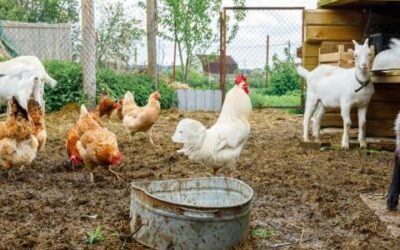
Fall is finally at our doorsteps, and the blazing hot summer is behind us. You may believe that once the weather starts cooling down, you have less work to do outside—but there are plenty of important lawn preparations you need to make for winter. Today’s blog is all about essential fall lawn care and maintenance that will prepare your grass for a bountiful spring, so let’s get into it.
Leaves: What To Do About Them?
The first thing that comes to mind when thinking about fall lawn care is the plethora of pretty leaves that scatter over your grass. While it may seem like the best thing to do is rake them all into a big pile and jump in, there are many more uses for dead leaves that will benefit your lawn’s health. You do need to do something about them, though—leaving dead leaves on the lawn can suffocate the grass underneath and lead to stunted growth in the spring.
Mow Leaves Into Leaf Mulch
Leaves, when chopped into tiny pieces, provide your lawn with excellent mulch that will break down easily. You may need to spread the leaves equally around your lawn to provide coverage to all the grass you can. Leaf mulch does not cost you anything, and mowing over leaves can be far easier than raking or using a leaf blower on them. No piles of leaves mean no more leaf maintenance beyond mowing them!
Compost Leaves Into Leaf Mold
Leaf mold provides a healthy soil conditioner for your future gardens, and you can use the fallen leaves in your backyard to make it! Despite its name, leaf mold looks like normal soil once the natural composting process is complete. It can be made in smaller batches by stuffing leaves into garbage bags and puncturing them. Once filled and punctured, set the bags aside somewhere they will not be moved or disturbed for one year or more. You can then use the leaf mold to enhance your garden soil or even as a potting mix!
Raking or Blowing Leaves
If you have no other use for leaves, raking or blowing them into piles is a classic solution. Once they’re dry, you can use them as a bonfire starter or dispose of them. You can also rake them into any tree-line behind your yard.
Add Fertilizer To Your Lawn
Before the first frost, make sure to give your grass the fertilizer it needs to stay strong through the harsh winter months. Adding fertilizer during the fall months strengthens roots and creates a more resilient lawn for all seasons.
Aerate Your Lawn
Over time, lawns will get compacted and grass growth will become weaker. Prevent compacted lawns by aerating the soil. You may notice compacted soil in areas of your lawn where water pools up or floods. Aeration pokes holes into the earth that allow for oxygen and water to be absorbed more easily by your lawn. If you have thatch buildup, aerating your lawn can prepare it for easy thatch removal. Aeration is a good step to take before planting new growth as well.
Reseed Grass
After a long summer season of work and play in your lawn, there will be bald spots where grass has died or been torn out. Seeding the lawn in the fall allows for the roots to establish before the big freeze and supports new growth to survive drought during the warm months. Know what kind of grass you grow in your lawn—whether it is cool-season or warm-season grass. Some states have a mix of both. The type that is planted in the fall is typically cool-season grass.
Spread the seeds up and down the patch and then side to side to ensure the best coverage. Gently go over the seeds with a rake to spread a thin layer of dirt over them. When raking, you do not want to move the seeds too far. You will still see some seeds on the surface, and that is normal.
Once you have seeded the lawn, you need to protect the new seeds. New seeds look tasty to birds and rodents and can be susceptible to excessively wet or dry weather. Ground cover products, such as Lucerne Farms’ straw mulch, will protect the new seeds from danger and will not add weeds to your lawn.
Keep Mowing
It can be a hassle to continue mowing when it is cold outside, but you will want to keep mowing the lawn until it stops growing for the season. When you notice that the grass has stopped growing, make sure that it is cut to about 2 ½ to 3 inches to prevent pesky voles and debilitating diseases that arise in lawns that are too long.
Water Your Lawn
Just because the weather is cooling down does not mean that nature is providing enough water for a healthy lawn. Give your lawn a hearty watering during dry periods or whenever it looks like your grass needs it. Once it stops growing, you can stop watering it. You do not want the water to freeze! Make sure to store hoses in the garage or other sheltered area before the first hard freeze to prevent damage.
Protect Your Plants
Frigid weather can be a dangerous hazard for many plants. If you have landscaping plants that need winter protection, cover them with a protective barrier before the first frost of fall. Larger plants can be covered with burlap or garden fabric. You can attach the barrier of fabric to stakes for widespread protection.
Provide your plants with mulch to insulate their roots. Much like how it protects grass seed in the cold weather, it will protect your garden plants too. Be sure to water your plants when the soil is dry. Plants will not need as much water when they are dormant, but giving them a drink when the temperature is above 40°F will keep them quenched until spring.
If you are growing trees, brace them with wooden stakes to prevent winter-related damage. You can add mulch around the base of trees to protect them as well, though fully grown, healthy trees should be perfectly fine during the winter.
Once you have taken care of the essential fall lawn care and maintenance, you can finally relax during the cold winter months. Preparing your lawn now makes it easier to begin again in the spring and will make your grass stronger than before. Maintain your beautiful lawn and prepare it for the year ahead!





